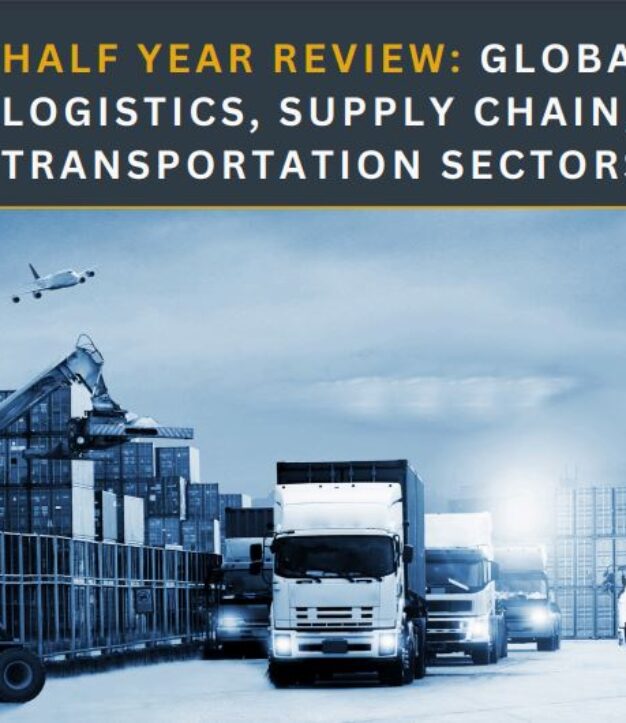Monetising Sustainability: Transforming ESG Initiatives into Profit Drivers
By Tom Graham
Environmental, Social and Governance (ESG) is a strategic priority and opportunity for growth within the logistics and supply chain sector. However, according to a report by Sage, while 83% of SMEs say that sustainability is a priority, just over 58% are making a commitment to it, due to high costs, complexities around reporting and the difficulty in finding the right people to lead ESG initiatives. This is particularly the case within SME and mid-market organisations, who often lack access to the expertise needed to address this complex topic.
What are the challenges?
For SME logistics businesses, embedding Environmental, Social, and Governance (ESG) principles into their operations often presents a significant challenge. While the importance of ESG is widely recognised, many small to mid-sized enterprises (SMEs) face barriers that make implementation complex and, at times, appear secondary to immediate operational concerns. Understanding why ESG can feel so challenging is critical to developing a strategic approach to overcome these hurdles.
Environmental
The environmental aspect of ESG demands significant commitments that can feel disproportionately burdensome for SMEs. Transitioning to sustainable practices, such as electrifying vehicle fleets or investing in renewable energy, often requires capital investment that may not align with tight budgets. Furthermore, smaller businesses may lack the scale needed to negotiate sustainable options within their supply chain or access government incentives. Coupled with operational dependencies on fossil fuels and infrastructure limitations, the pathway to reducing emissions and building climate resilience can seem both costly and complex.
Social
Addressing the social dimension of ESG requires a balance between maintaining operational efficiency and meeting the growing expectations of employees, customers, and stakeholders. Fair pay, equal opportunities, and fostering a diverse workforce are essential but can feel ambitious within the constraints of a competitive and cost-sensitive industry. Similarly, implementing more robust data security measures or prioritising supplier fairness can require resources and expertise that many SMEs find challenging to allocate. Social impact, while vital, is often seen as a long-term consideration, competing with the day-to-day demands of running the business.
Governance
Governance often proves to be the most intangible and overlooked pillar for SMEs. Many owner-managed businesses operate with lean teams and centralised decision-making, making the introduction of formal governance structures or frameworks seem unnecessary, unfamiliar or resource-intensive. Transparency in reporting, diversity in leadership, and the establishment of comprehensive accountability systems are critical but can appear disconnected from immediate operational priorities. For businesses focused on growth and survival, governance improvements may seem like a long-term aspiration rather than an urgent requirement.
While ESG implementation challenges for SMEs in the logistics sector are real, they are not insurmountable. By recognising these hurdles and addressing them strategically, organisations can position themselves to capture the significant opportunities that ESG investments offer.
Why Companies Are Willing to Pay for Sustainability Solutions
According to Deloitte’s 2024 Sustainability Action Report over half of the stakeholders questioned recognised both internal and external benefits in ESG, with greater efficiencies, lower risk, enhanced trust, brand reputation, talent attraction and higher pricing abilities heading the list of business outcomes.
Increasing numbers of investors are factoring in ESG initiatives when looking for investment opportunities which means that as well as being of benefit to the environment and people, it has the potential to grow a business.
Having an ESG strategy demonstrates that an organisation is committed to reducing risks in the long term, making it attractive to premium investors in terms of long-term profitability, as well as giving it a competitive advantage. Organisations with robust ESG strategies are frequently valued higher than their competitors.
They also improve operational efficiency through waste reduction initiatives which result in substantial savings in the long run, helping enhance efficiency and build internal resilience.
McKinsey’s report, titled “Five ways that ESG creates value” highlights an increase in revenue, a reduction in costs, the minimisation of regulatory and legal interventions, an increase in employee activity and the optimisation of investment and capital expenditures as the key modes of extracting business value from ESG.
Challenges
In terms of practicalities, commercial property specialists Knight Frank produced a report exploring the ESG initiatives within the logistics sector. The three main challenges for logistics organisations, according to them, are a rise in the demand for sustainable and well-specified warehouses, how energy-efficient warehouses currently are, and the challenges of meeting BREEAM Certification standards.
More broadly, in transportation and fleet management, many organisations are uncomfortable with change, and worry about associated costs or new technologies which could result in them feeling overwhelmed or concerned about meeting their customers’ demands.
The solutions to these issues are for businesses to lead from the top down, aligning management with ESG values, and educating employees about their role in achieving sustainability goals. Simplified technological solutions can also overcome resistance and assist in adapting processes to changing business needs.
Revenue Pathways through Sustainability in Logistics
Despite some organisations having concerns about initial investment costs, particularly in the logistics sector, reporting on the effectiveness of ESG initiatives is becoming easier thanks to the use of technology. Many companies now utilise energy-saving solutions such as low-energy light bulbs in warehouses, for example, and increasing numbers of logistics firms are making the switch to electric vehicles, highlighting the cost savings they are making by becoming more sustainable.
Other sustainable revenue pathways can be created in a number of ways:
- Route planning – to reduce the costs associated with transportation, and to minimise carbon emissions, many organisations now use tracking and route optimisation technology. This ensures that vehicles make the most fuel-efficient journeys possible.
- Attract new clients – according to the European Logistics & Supply Chain Sustainability Report 2024 40% of logistics companies have won new custom thanks to their sustainability efforts. As more organisations realise the value of their ESG initiatives, it becomes more valued among suppliers and clients. Clients are also more likely to demonstrate their loyalty if a company’s ESG efforts are highlighted and celebrated.
- Increase prices – by positioning themselves as early adopters of ESG initiatives, organisations can charge premium prices for their services.
The Tangible Benefits of Monetising ESG in Logistics
Implementing ESG in logistics provides tangible benefits for companies. These include:
Attracting lenders and investors – Gallup noted that 48% of investors are interested in investing in companies that have put concerted efforts into being ESG-compliant. By being sustainable and mindful of ESG principles, organisations can attract new money into their business.
Improving financial performance – every ESG effort such as instigating a paperless office, or fitting an aerator on a tap to save water will save money and improve an organisations ROI and balance sheet. In addition, ESG-compliant companies are less exposed to penalties and fines which can impact financially.
Sustainable operations – organisations that operate according to ESG principles enjoy more cost-saving opportunities, lower energy bills and reduced waste which contributes to lower operational costs.
Recruitment and retention – a shift in perception from younger employees means that organisations must take ESG seriously to attract talent, and ensure they stay. By placing ESG at the heart of an organisation’s values, it will attract people who share those views.
Holmes Noble’s Perspective on Building ESG Leadership
ESG initiatives present many opportunities but can also be challenging for organisations’ leaders to implement and maintain. However, finding the right people to lead ESG initiatives is paramount.
Here at Holmes Noble we understand that ESG is the key to unlocking growth and resilience. Our Chief Executive, Amy Speake, prepared a report on this subject, which can be downloaded here, and which demonstrates how seriously many CEOs are taking the subject.
As a Partner at Holmes Noble, leading our Global Logistics and Transportation Practice, I see firsthand how ESG remains a strategic priority for large multinational logistics organisations. However, in recent conversations with leaders of SMEs and mid-market firms, it’s clear that ongoing financial pressures have made it challenging to prioritise ESG initiatives. These pressures have understandably shifted focus to immediate survival and operational efficiency. Yet, ESG is a complex, shared responsibility—one where collective action benefits everyone. At Holmes Noble, we are committed to fostering collaboration within the logistics community by educating and connecting leaders through events, consultations, and strategic discussions on crucial topics like ESG.
For more advice on how toturn ESG initiatives into profit drivers, contact us here.



